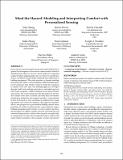Mind the Hazard: Modeling and Interpreting Comfort with Personalized Sensing
Author(s)
Zhang, Yufei; Favero, Matteo; Chwalek, Patrick; Zhong, Sailin; Lalanne, Denis; Paradiso, Joseph A.; Miller, Clayton; Sonta, Andrew; ... Show more Show less
Download3671127.3698188.pdf (741.5Kb)
Publisher Policy
Publisher Policy
Article is made available in accordance with the publisher's policy and may be subject to US copyright law. Please refer to the publisher's site for terms of use.
Terms of use
Metadata
Show full item recordAbstract
Recent advances in personalized sensing and comfort feedback have spurred the development of data-driven comfort models tailored to individual needs. However, because current models treat sequential comfort feedback independently, they are subject to unstable predictions and limited interpretability, hindering their deployment in building management. This study introduces a dynamic modeling framework that utilizes a Neural Ordinary Differential Equations-based Continuous-time Markov Chain to model the transitions in comfort states over time. Our modeling approach, developed through a field study utilizing smart glasses and mobile app feedback, tracks occupants' comfort transitions across daily activities and contexts. The results demonstrate that this model not only predicts comfort states more accurately and stably than conventional classification models but also uniquely provides a representation of how the hazards of state transitions are influenced by changing ambient and contextual conditions. This approach, therefore, offers a new perspective on personalized building control, where predictions of comfort transition hazards can preemptively suggest building management interventions to avoid occupants experiencing discomfort. In addition, insights into how environmental and contextual characteristics relate to these hazards can guide holistic management strategies that dynamically balance comfort with energy targets in response to the occupants' activities and contexts.
Description
BuildSys ’24, November 7–8, 2024, Hangzhou, China
Date issued
2024-10-29Department
Massachusetts Institute of Technology. Responsive Environments GroupPublisher
ACM|The 11th ACM International Conference on Systems for Energy-Efficient Buildings, Cities, and Transportation
Citation
Zhang, Yufei, Favero, Matteo, Chwalek, Patrick, Zhong, Sailin, Lalanne, Denis et al. 2024. "Mind the Hazard: Modeling and Interpreting Comfort with Personalized Sensing."
Version: Final published version
ISBN
979-8-4007-0706-3